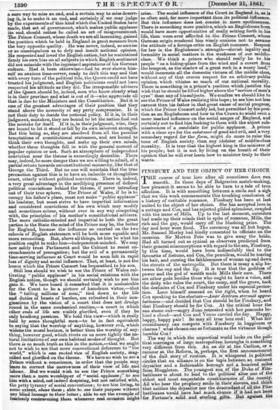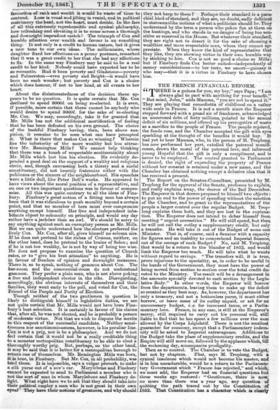FINSBURY AIM THE OBJECT OF HER CHOICE. T HE course of
true love after all sometimes does run smooth. In these days of Belgravian match-making, how pleasant it seems to be able to turn to a tale of true affection. It is with something between a smile and a sigh that we this week commemorate this touching conclusion of a history of veritable romance. Finsbury has been at last united to the object of her choice. She has accepted love in a cottage and Cox, and has rejected gilded splendour, coupled with the name of Mills. Up to the last moment, outsiders had made up their minds that in. spite of romance, Mills, the rich and the gay, would carry off the blushing prize. The day and hour were fixed. The ceremony was all but begun. Mr. Samuel Morley had kindly consented to officiate on the occasion. Sir Morton Peto was to give away the bride. Had all turned out as cynical as, observers predicted from their general misconceptions with regard to the sex, Finsbury, by this time, would have been indissolubly tied to the favourite of fortune, and Cox, the penniless, would be tearing his hair, and cursing the faithlessness of woman up and down the streets of the metropolis. But there is many a slip be- tween the cup and the lip. It is true that the goddess of power and the god of wealth made Mills their care. There are other gods besides these who ought to have a voice, and the deity who rules the court, the camp, and the grove, took the destinies of Cox and Finsbury under his especial protec- tion. Love himself sneezed on the right, when he heard. Cox speaking to the electors—Amor dextram sternuit appro- bationem—and decided that Cox should be for Finsbury, and that Finsbury should be for Cox. At the critical hour the sun shone ont—angry Juno retreated with her peacocks be- hind a cloud—and Cox and Venus carried the day. Happy, happy, happy pair ! So may all true love encl.! What fair constituency can compete with Finsbury in happiness or charms ? what chosen one so fortunate as the virtuous though humble Con? The way in which the unpoetical world looks on the poli- tical marriages of large metropolitan boroughs is something very different from this. An on (lit at the Carlton, or a rumour at the Reform, is, perhaps, the first announcement of the dull story of routine. It is whispered in political circles that an alliance is on the tapis between an eminent drysalter and a fashionable borough not a hundred miles from Muggleton. The youngest son of the Duke of Fitz- battleaxe is about to lead to the political altar one of the oldest and most respectable constituencies of the county. All who hear the prophecy smile in their sleeves, and think that neither the drysalter nor the descendant of all the Fitz- battleaxes would have had much chance if it had not been for Fortune's solid and sterling gifts. But against thO favourites of rank and wealth it would be waste of time to contend. Love is venal and jilting is venial, and in political matrimony the head, not the heart, must decide. in the face of all this extremely reprehensible and cynical philosophy, how refreshing and elevating it is to come across a thorough and downright imprudent match ! The triumph of Cox and humble affliction over wealth and favour is an ennobling thing. It not only is a credit to human nature, but it gives a new tone to our own. ideas. The naillionnaire, whose daughter fixed her affections on a penny postman, remarked that it was a great credit to her that she had any affections to fix. In the same way Finsbury may be said to be a real credit to her kind. Nobody could have expected her to be so romantic. Had it been poverty and Gladstone—poverty and Palmerston—even poverty and Bright—it would have been no such wonder ; but poverty and Cox is a choice which does honour, if not to her head, at all events to her heart.
About the disinterestedness of the decision there ap- pears to be no question. It is quite certain that Mr. Cox declined to spend 3000/. on being re-elected. It is even, if possible, more certain that there cannot be anybody who would desire to spend 3000/. for the sake of re-electing Mr. Cox. We may, accordingly, take it for granted that Mr. Mills has not the additional mortification of feeling - that he has been defeated on his own ground. The choice of the bashful Finsbury having, then, been above sus- picion, it remains to be seen what can have prompted it. What is there that makes Cox so winning ? Wherein lies the inferiority- of the more wealthy but less attrac- tive Mr. Remington Mills ? We cannot help thinking that there was a touch of respectable sentimentality about Mr. Mills which lost him his election. He evidently de- pended a good deal on the support of a wealthy and religious circle, and, though canvassing both a thirsty and a sinful constituency, did not heartily fraternize either with the publicans or the sinners of the neighbourhood. His speeches were a little dull, like Peter Bell's works. He appeared to have views about the moral position of a representative, and on one or two important questions was in favour of compro- mise. All this was quite contrary to all the ideas of Fins- bury. Finsbury's great notion of a fitting man has always been that it was ridiculous to push morality beyond a certain point, and that no member of hers must ever compromise anything except himself. Her free and independent inha- bitants object to solemnity on principle, and would any day rather have a jackdaw than an owl. We should be sorry to say anything against such an exemplary person as Mr. Mills. But we can quite understand how the electors preferred the lively Cox. Mr. Cox, after all, gives himself no solemn airs. If he does not pretend to the riches of Crcesus, neither, on the other hand, does he pretend to the brains of Solon; and if he is not too wealthy, he is not by way of being too wise. He does not propose to examine the question of Church rates, or to "give his best attention" to anything. He is in favour of freedom of opinion and downright measures. There is, so to speak, nothing of gammon about Cox. The bar-room and the commercial-room do not understand gammon. They prefer a plain man, who is not above poking a free and independent elector in the ribs. Disregarding, accordingly, the obvious interests of themselves and their families, they went early to the poll, and voted for Cox, the Friend of the People and Purity of Election. Though neither of the two gentlemen in question is likely to distinguish himself in legislative duties, we are not quite certain that Mr. Mills would not have been Fins- bury's best selection. It is certainly in favour of his claims that, after all, he was not elected, and he is probably a person of moderate virtue. Not that we wish to dispute the merits in this respect of the successful candidate. Neither sensi- tiveness nor sanctimoniousness, however, is his peculiar line. Cox is not a prig, nor is he a philosopher. And we do not feel certain that it would not be a really creditable thing to a monster metropolitan constituency to be able to elect a thoroughly worthy prig. But, perhaps, on the other hand, it may be said that it is better for a metropolitan borough to return one of themselves. Mr. Remington Mills was born, it is true, in Finsbury. But Mr. Cox, in all probability, was bred there. It is impossible, says a vulgar proverb, to make a silk purse out of a sow's ear. Marylebone and Finsbury cannot be expected to send to Parliament a member who is not the sort of man in whom Marylebone and Finsbury de- light. What right have we to ask that they should take into their political employ a man who is not great in their own eyes? They have their notions of greatness, and why should they not keep to them ? Perhaps their standard is a paro- chial kind of standard, and they are, no doubt, sadly deficient in statesmanlike notions of what a politician should be. They understand by the term a person who pokes fun at them on the hustings, and who stands in no danger of being too sen- sitive or reserved in the House. But whatever their standard, they are right not to desert it for the sake of choosing a wealthier and more respectable man, whom they cannot ap- preciate. When they know the kind of representative that they like, they are showing virtue in their own humble way by sticking to him. Can is not so good a choice as Mills ; but if Finsbury finds Cox better suited—independently of money considerations—to her taste, we assert—gainsay it who may—that it is a virtue in Finsbury to have chosen him.































 Previous page
Previous page